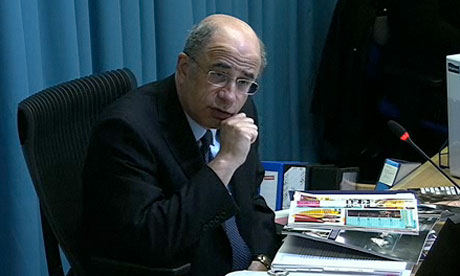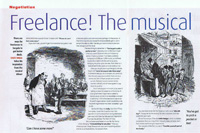 I lunched with Andy Barrow, captain of the GB wheelchair rugby team, at the Charlton Park rugby club vice-presidents’ day yesterday.
I lunched with Andy Barrow, captain of the GB wheelchair rugby team, at the Charlton Park rugby club vice-presidents’ day yesterday.
I follow Andy on Facebook. I was surprised to see him at the club as he is always abroad, usually playing for Team GB in another tournament, though sometimes just on a well-deserved holiday.
He’d just been with some Charlton Park players at the Dubai rugby sevens. He’s off next week to watch the cricket in South Africa.
Facebook friends
Andy follows me on Facebook. “How do you write seven stories before breakfast every day?” he asked. “I have to write one blog a week for the team’s website and it takes me ages.”
If that’s true – and I suspect it was just flattery – writing is one of a short list skills Andy has not mastered. He has become an expert press spokesperson for the team. He has negotiated higher levels of sponsorship from the RFU. And he is learning to be a motivational speaker.
All of that is on top of taking on the team captaincy. He will be captain at the London Olympics and possibly the Olympics beyond that. Andy has broad shoulders – both physically and metaphorically.
Follow the money
I’m going to ring Andy tomorrow and interview him in more detail about the finances involved in getting elite wheelchair athletes to the top of their sports. Andy has to chase up various grants, gifts and sponsorship to fund his sport.
I’ve been reading the NUJ’s guidelines for reporting disability. Well-meaning though they are, they are very hard to stick to.
“Ditch the super-crip stories – they are patronising and set disabled people impossible standards. Report disability sports as you would any other sport,” they begin. So that’s reporting Andy out of the question. And my headline will have me drummed out.
Spanish practices
“Would this be a story if the person was not disabled?” is another question. If the captain of the GB wheelchair rugby team were not disabled, it would be a bigger story. In 2000 Spain’s wheelchair basketball team all jumped out of their wheelchairs after the final whistle. It was a scandal.
“Is the person’s impairment really relevant to the story?” is another question. How can it not be? The players get graded by their level of disability and the team has to maintain a certain average disability score of players on the pitch at any one time.
“Life isn’t a ‘trial over adversity’ – most disabled people don’t see it that way,” the guidelines say. Well I am sorry but other people do see it that way. We’d report nothing interesting if the measure was whether the people doing the interesting thing “don’t see it that way”.
The best
Andy is an extraordinary person. He broke his neck playing rugby aged 17. When I visited him in hospital at the time he was determined to walk again. If anybody could have done, he would. When that dream died he turned to being the best wheelchair rugby player he could be.
I interviewed his doctor for The Guardian, shortly after Andy came out of hospital. He said that stem cell research might actually mean they could make a paraplegic walk again at some point in the future (Andy is tetraplegic – he has limited use of his hands too).
Yesterday I asked Andy about that. He’s happy just the way he is, thanks. He is one of the most level-headed people I know. He is a realist, understands the limitations his sporting career has and is readying himself for a second career afterwards.
He will be just as successful at whatever that is too.
Links (open new windows)



 An email discussion with freelances today about stagnant rates prompted me to dig out an article I wrote more than a decade ago on how to get a rate rise – based on the musical Oliver. It appeared in The Journalist in December 1999. I have reproduced it below.
An email discussion with freelances today about stagnant rates prompted me to dig out an article I wrote more than a decade ago on how to get a rate rise – based on the musical Oliver. It appeared in The Journalist in December 1999. I have reproduced it below.
 I lunched with Andy Barrow, captain of the GB wheelchair rugby team, at the Charlton Park rugby club vice-presidents’ day yesterday.
I lunched with Andy Barrow, captain of the GB wheelchair rugby team, at the Charlton Park rugby club vice-presidents’ day yesterday. True to the words of Arnold Schwarzenegger’s robot assassin in the Terminator, I am back and I’m blogging again. (I had complaints that I had stopped blogging – thanks for those.)
True to the words of Arnold Schwarzenegger’s robot assassin in the Terminator, I am back and I’m blogging again. (I had complaints that I had stopped blogging – thanks for those.)
